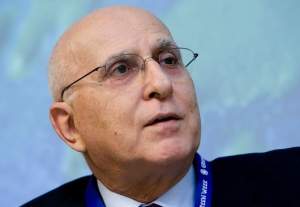 Foreign Minister Stavros Dimas represented Greece today at the EU Foreign Affairs Council. The main subjects on the agenda were the developments in Syria – in light of the meeting in Tunis of the “Friends of the Syrian people” – the political situation in Egypt, progress in the Belgrade-Pristina talks, the frozen conflicts in the Southern Caucasus, and the prospects for the reopening of direct negotiations between the Israelis and the Palestinians.
Foreign Minister Stavros Dimas represented Greece today at the EU Foreign Affairs Council. The main subjects on the agenda were the developments in Syria – in light of the meeting in Tunis of the “Friends of the Syrian people” – the political situation in Egypt, progress in the Belgrade-Pristina talks, the frozen conflicts in the Southern Caucasus, and the prospects for the reopening of direct negotiations between the Israelis and the Palestinians.
In his statement on Syria, Mr. Dimas emphasized the need for an immediate ceasefire, protection of civilians, and the opening of a process of political transition to return the country to stability. Mr. Dimas underscored the importance of the shaping a single political platform by the opposition forces, with the participation of all population groups and in a manner that will ensure the protection of all minorities living in the country. Mr. Dimas noted that Greece supports the Arab League’s initiatives and considers cooperation amongst all the international powers to be imperative in dealing with the crisis, hoping that the Security Council will continue the relevant deliberations on reaching a consensus on how to manage the crisis. Finally, Mr. Dimas reiterated Greece’s willingness to continue its active participation in the diplomatic initiatives aimed at resolving the crisis via political means, noting Greece’s opposition to military options.
With regard to Egypt, Mr. Dimas expressed Greece’s support for the transition process, noting that the European Union has a duty to stand by the Egyptian people at this critical time, investing in the country’s development, which is vital to strengthening reforms. In the discussion of the Middle East peace process, Mr. Dimas emphasized the importance of the reopening of direct negotiations between the Israeli and Palestinian sides, expressing his disappointment at the interruption of the direct meetings that took place through a Jordanian initiative.
The Foreign Affairs Council also looked at the progress in the Belgrade-Pristina talks, and tomorrow’s General Affairs Council is to discuss the matter of Serbia’s being given candidate-country status. During the relevant discussion, Mr. Dimas stressed the importance to the Western Balkan region of Serbia’s being given candidate-country status and of a speedy launching of the accession negotiations, while he welcomed the recent agreement within the framework of the Belgrade-Pristina talks and the constructive spirit exhibited by both sides. Moreover, he stressed the need to strengthen the European perspective of the whole region; a perspective that functions as a catalyst for stability. He also noted that Greece’s policy is economic progress and the improvement of the day-to-day lives of all the region’s residents, regardless of faith or ethnicity, adding that the agreement on Kosovo’s participation in regional cooperation organizations confirms Serbia’s constructive stance and dedication to this purpose.
Within the same framework – and given the boost this would provide to the economic development of Kosovo and the whole region – Mr. Dimas announced that the Greek government accepts Kosovo’s participation in the European Bank for Reconstruction and Development (EBRD), clarifying that Greece’s stance on the declaration of Kosovo’s independence remains unchanged and firm and noting the importance of the continuation of the dialogue between the two sides.
On the margins of the Council, Mr. Dimas met with Estonian Foreign Minister Urmas Paet, with whom he signed a Memorandum of Cooperation between the two countries. The two Ministers agreed to an intensified exchange of visits and political consultations on the ministerial and political level, on issues concerning the European Union, security, immigration and asylum, multilateral cooperation, and bilateral relations.
February 27, 2012


